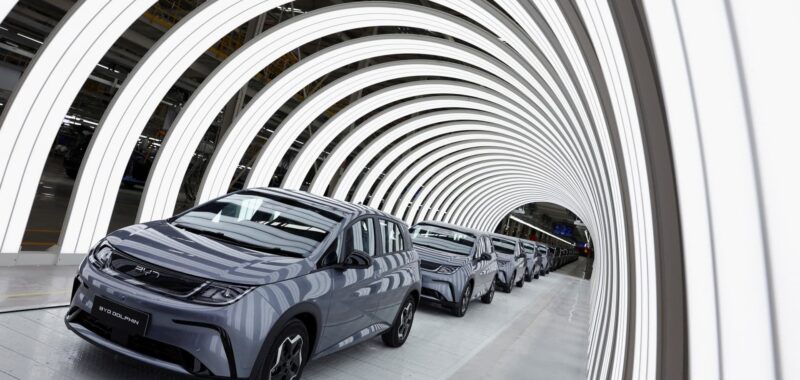As electric car giant BYD gets serious about driver-assistance systems, analysts expect its suppliers can benefit. Shares of the Hong Kong-listed automaker hit a record high in the past week after the company launched a driver-assistance system for a range of its cars, including one of its low-cost models priced below 70,000 yuan (roughly $9,600). BYD also said it’s integrating DeepSeek’s artificial intelligence capabilities. Companies that sell parts for BYD’s new driver-assist system “are likely to enjoy solid growth ahead,” Nomura analysts said in a note Tuesday. “Meanwhile, we believe more [car manufacturers] will have to accelerate their smart driving functions upgrade in order to catch up with peers, and this may result in increasing demand for smart driving-related components in the entire auto market,” the analysts said. Their picks include the automaker’s Hong Kong-listed subsidiary BYD Electronics , which makes autonomous driving components, Hong Kong-traded chipmaker Horizon Robotics and lidar developer Hesai Tech , listed in the U.S. Lidar is short for light detection and ranging. In driver-assist systems, a lidar sensor uses lasers to create a 3D map of a car’s surroundings. Driver-assist features have increasingly become a selling point for automakers in China’s competitive electric car market. Tesla , whose Full Self-Driving has yet to get China’s approval, saw its shares tumble on Tuesday following the news of BYD’s driver-assist rollout. China’s efforts to build tech self-reliance and U.S. restrictions have supported the development of a homegrown ecosystem. BYD’s driver-assist announcements Monday were focused on the China market, rather than the automaker’s export business. Beijing-based Horizon Robotics is one of BYD’s major chips suppliers. BYD’s founder and chairman Wang Chuanfu said at a Horizon Robotics event last year that the future of electric cars would rely on semiconductors. Goldman Sachs analyst Allen Chang on Monday raised his price target on Horizon Robotics to 6.95 Hong Kong dollars (89 cents), up from 6.10 HKD previously, based on expectations of higher earnings. The firm rates the stock a buy. “With another push by major car [manufacturers] to bring smart driving to lower-priced cars, we are positive on the ability of Horizon Robotics, as one of the leading smart driving chip providers in China, to obtain more design-wins with its Journey 6 new chipset series,” the report said. Chang expects the Journey 6 series to grow from 3% of the chip company’s revenue this year to 40% in 2027. Shares have already soared more than 60% year to date as of Thursday’s close at 5.88 HKD. In a separate note Monday, Goldman analyst Verena Jeng raised her price target on buy-rated BYD Electronics to 58.46 HKD, up from 51.02 HKD previously. The stock has gained more than 30% so far this year to 56 HKD as of Thursday’s close. The Goldman report noted expectations that more than 3 million BYD cars will adopt advanced driver-assist this year, and pointed out that since the systems are pricier than, say an automotive speaker, that will increase how much revenue BYD Electronics can generate per car. BYD’s “Dipilot” driver-assist system uses different components depending on price point. The most basic one uses Horizon Robotics’ chipset along with Nvidia ‘s Orin, while more advanced versions only use other Nvidia chips, according to Nomura’s research. The driver-assist versions that support driving on city streets use lidar from companies such as Hesai, Nomura pointed out. While Hesai is contesting U.S. government allegations that it supports the Chinese military, Goldman Sachs analysts in mid-January upgraded the U.S.-listed stock to a buy from neutral, citing the company’s new product cycle, according to FactSet. The analysts raised their price target on Hesai to $18.40 from $5.50. — CNBC’s Michael Bloom contributed to this report.

